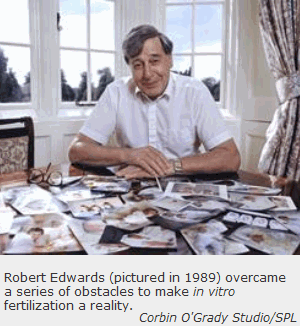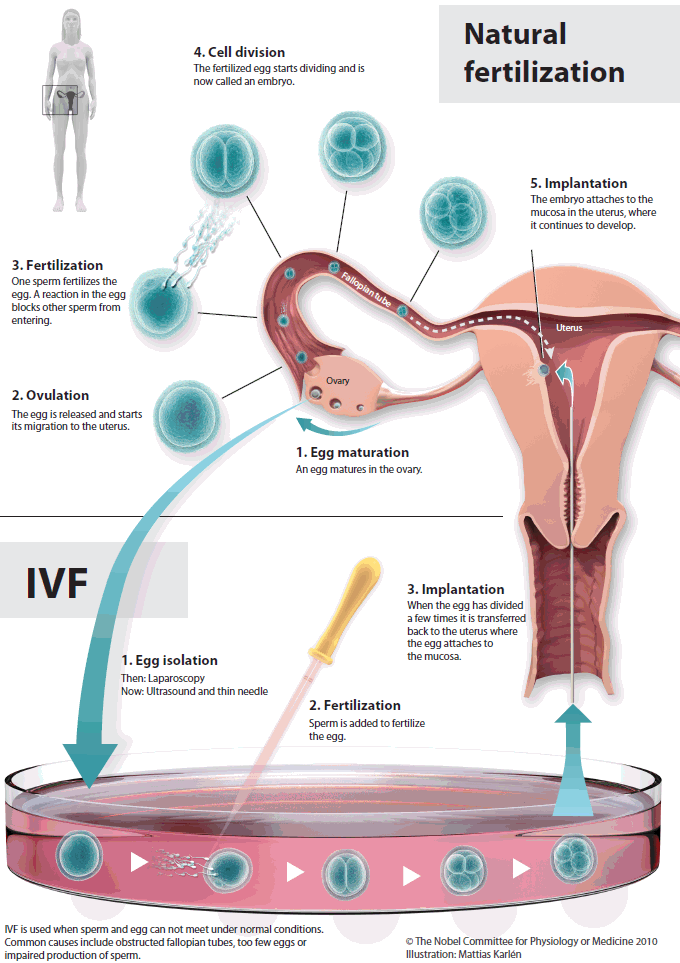|
|
|
|
|
|
|
News & Views item - October 2010 |
![]() 2010
Nobel Prize in Physiology or Medicine Awarded for Development of In Vitro
Fertilization. (October 5, 2010)
2010
Nobel Prize in Physiology or Medicine Awarded for Development of In Vitro
Fertilization. (October 5, 2010)
 The
Nobel Prize for 2010 in Physiology or Medicine has been awarded to now Cambridge
University professor emeritus Robert Edwards "for the development of in vitro
fertilization". Professor Edwards' work made it possible to treat infertility,
which affects more than 10% of all couples.
The
Nobel Prize for 2010 in Physiology or Medicine has been awarded to now Cambridge
University professor emeritus Robert Edwards "for the development of in vitro
fertilization". Professor Edwards' work made it possible to treat infertility,
which affects more than 10% of all couples.
Now aged 85, Professor Edwards was too frail to take the call from Stockholm; the news was relayed by his wife.
Professor Edwards had noted in the 1950s that rabbit egg cells could be fertilized in the lab and give rise to viable offspring. Working systematically he "clarified how human eggs mature, how hormones regulate their maturation, and when the eggs can be fertilized by sperm. He also figured out the conditions necessary for sperm to activate and fertilize the egg. In 1969, he and his colleagues managed to fertilize a human egg in a "test tube" for the first time. But the resulting embryo was fragile and didn't develop".
Professor Edwards' next developed a collaboration with gynaecologist Patrick Steptoe, who had developed the technique of laparoscopy to retrieve mature eggs from ovaries. However, strongly voiced opposition to the research resulted in the withdrawal of Medical Research Council funding, which was overcome through private donation and it took until 1978, for the first "test tube baby", Louise Brown, to be born. Dr Steptoe died in 1988; thereby excluding him from being a co-recipient for the 2010 award.
As Science notes Professor Edwards was actively involved in the ethical debates right from the beginning of the research. In a 1999 talk he said: "We were interested in the ethical situation from before we began. The first ethical papers were written by my colleagues and myself...We wrote ethical papers in 1970 in Nature, and before that in other journals. … And so nobody can say that the ethicists ran the ethical debate about IVF. They didn't."
Cambridge University embryologist and stem cell researcher Roger Pedersen told Science: "They were definitely swimming upstream... The medical community was not receptive [of their work]. But what of course happened is that they revolutionized the treatment of infertility." The prize, he says, is a powerful acknowledgement "that fertility is a health issue."
In an interview with Nature Martin Johnson, one of Professor Edwards' first graduate students and now professor of reproductive sciences at the University of Cambridge recalled the "strange atmosphere" in the 1960s and 1970s, when the prospect of overpopulation seemed to be a bigger societal concern than infertility. "There was no awareness then of the personal pain of infertility," he says. "I remember eminent Cambridge scientists would tell us that our PhD supervisor was off his rocker." He also recalls Max Perutz and James Watson, both Nobel laureates at Cambridge, telling him it was irresponsible to interfere with the beginning of life. "Often people refused to speak to us in the tea room because they disapproved of what we were doing." Johnson stuck by Edwards though, finding him "inspirational and visionary".
The current comparable ethical debate regarding embryonic stem-cell research has been commented on numerous times.
__________________________________________________
